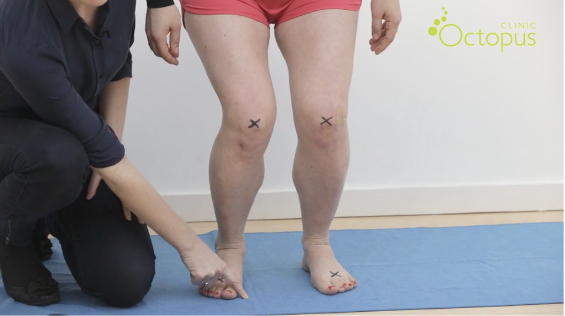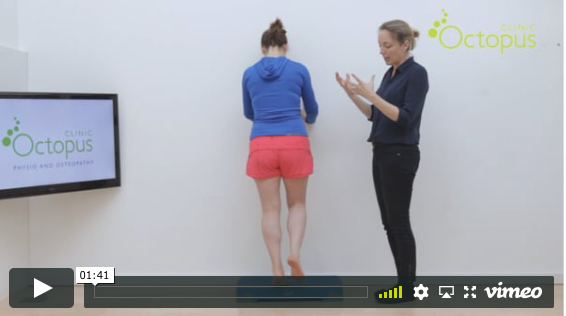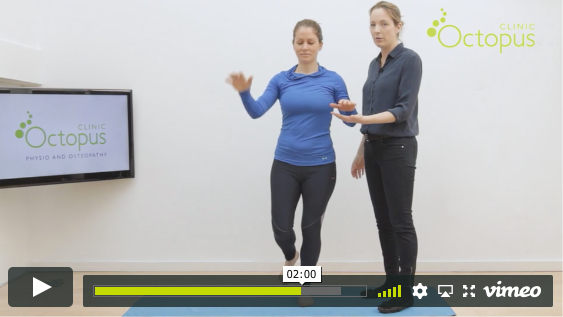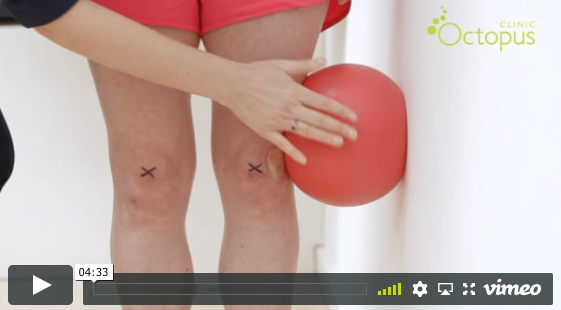Post-op rehabilitation after knee replacement surgery
The following advice has kindly been written by Lucy MacDonald, from The Octopus Clinic in Central London, and we are very grateful for her expert assistance.
Post op rehab – what is involved and why it is important?
by Lucy Macdonald, Physiotherapist, Octopus Clinic
Establishing timeframes
Your physiotherapist will be in close communications with your consultant so that they know exactly what was done in surgery. They will also need to know information like the condition of the structures of the knee that were seen by your consultant in surgery. This will help your physio to work out time frames for your treatment plan including when you will be able to return safely to certain activities or sports and what milestones you will need to achieve before returning to those activities. Your physio will explain this timetable so that you have a clear view of what you can expect both short and long term.
Your goals
Your physio will ask you for a detailed picture of all activities, hobbies, exercise and sports that you enjoy and tailor a treatment programme so that you are able achieve those things. They may use a score like the PSFS or ‘Patient Specific Functional Scale’ to make sure they keep your rehab focused on what you want to achieve.
Managing pain and inflammation
Your physiotherapist is an expert on the management of post-op pain and inflammation and will show you ways that you can reduce the pain and swelling yourself. They will explain when and how to use ice or heat, what knee support or braces might be useful for you to wear and show you how to apply tape to reduce your pain. If possible, they will provide hands on treatment like massage, acupuncture, joint mobilisations that can reduce your pain short term and enable you to do the exercises which will give you longer term relief.
Your physiotherapist will keep a close eye on your pain levels and if they are concerned you may need additional medications will contact your consultant to discuss these concerns.
Empowering and educating
Your physiotherapist will empower you to take control of your pain and plan your activities short and long term. To do this your physio will show you how to use an activity diary to make sure you are being steady with the amount of load the knees are taking and safe with the amount of weight going through them. Your physiotherapist will also educate you on exactly how much weight you can safely put through the knee and how much movement you should be doing to encourage healing and not cause any damage. They will explain to you how you know when you are doing too much or too little and the difference between good and bad pain.
Enabling healing and repair
Your physio will explain what foods are good for reducing pain and inflammation and, if you need to, how you can lose weight healthily. They will advise you on other things that will enable optimal healing like stress reduction, general exercise and sleep improvement.
Preventing secondary issues
Your physio will work to prevent any secondary issues post operatively for example patella-femoral joint pain or fat pad pain. Part of this process is to optimise the alignment or ‘biomechanics’ of your knee as early as possible post-op. To do this your physio will first analyse your movements. They will then show you how to adjust your movement to make sure the forces that are put through the structures of the knees are spread in a way that reduces pain. This can sometimes result in immediate reduction in your pain in daily activities like walking, getting up from sitting and going up and downstairs. Here is an example, do not do this exercise unless your physiotherapist has told you it is safe to do so: http://www.octopusclinic.com/videos/20-lower-limb-alignment-mini-squat/
Knee strengthening exercises
Your physio will show you how to strengthen the muscles that support your knees like the quadriceps at the front of the knee, hamstrings at the back and the calf muscles too. This helps to make sure that the muscles take as much load as possible rather than the knee joint itself. They will make sure that you work your muscles in a way that keeps them flexible as well as strong. It is often better to lengthen your muscles with ‘eccentric’ muscle activities rather than with passive stretching. Here is an example of this, do not do this exercise unless your physio has advised you that it is safe to do so: http://www.octopusclinic.com/videos/36-step-eccentric-calves-heel-raise/
Proprioception
Proprioception is the body’s positional sense and is fundamental for recovery and preventing long term recurrence of pain and injury. Your physio will therefore give you exercises addressing this as early in your post-operative recovery as possible. This is an example of an exercise for proprioception, please only do it under the guidance of your physio: http://www.octopusclinic.com/videos/70-balance-proprioception-standing-one-on-leg/
Hips, back and ankles
Your physio will make sure that you work on the stability muscles of your back, hips, ankles and feet. If these muscles are working properly then the knees are more efficient and less painful. Here is an example of one of these exercises, do not do this exercise unless your physio has said it is safe to do so: http://www.octopusclinic.com/videos/37-wall-ball-stage-1-standing/
Return to exercise and non-impact sport
Your physio is an expert in getting you back to your chosen exercise or non-impact sport safely. You will probably find that your technique and performance has improved due to the improvements in your biomechanics your physio has enabled over the course of your rehab. Silver linings!
Working with your consultant every step of the way
Your physio will contact your consultant if either of you have any concerns with your recovery and will let them know when you have been discharged back to 100% full health.
Contact Lucy
For more information on knees and to access the Octopus Clinic exercise video library for free please go to www.octopusclinic.com or contact Lucy Macdonald by email lucy@octopusclinic.com or phone 02075838288.





